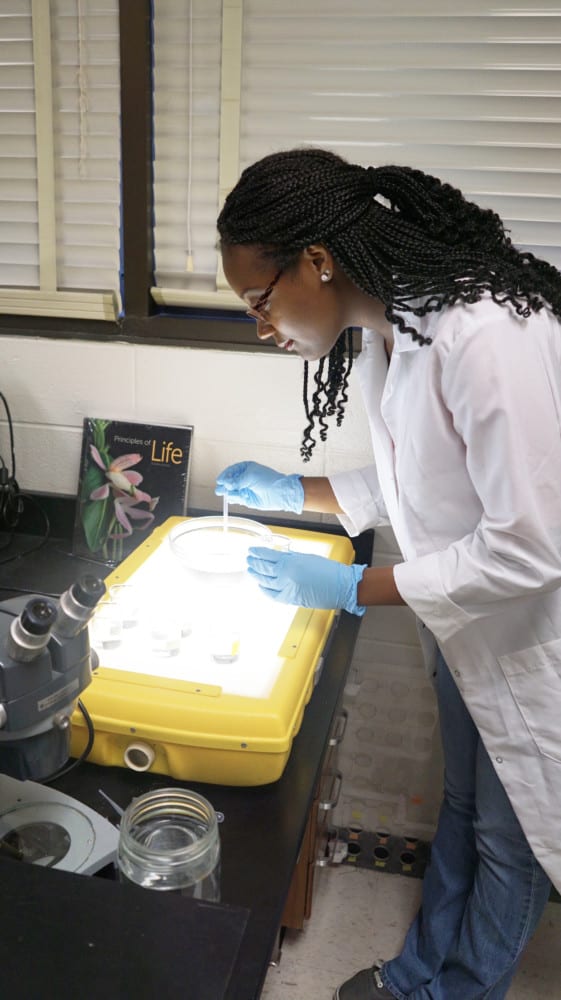CLEMSON, South Carolina — Zakiyah Henry, a sophomore biology major at Winston-Salem State University in Winston-Salem, North Carolina, used to think a biology degree led only to medical school. But this past summer she spent 10 weeks at Clemson University with the Research Experiences for Undergraduates (REU) program.
“Now my eyes have opened to research,” she said. “I am so glad I had this first-hand experience and consider the REU program to be a crucial research opportunity for me to define my career goals.”
The National Science Foundation funds the REU program to provide meaningful research experiences for students who do not get many research opportunities at their parent institutions and to bring more diversity into the scientific workforce in the United States. Clemson’s REU program has become quite popular; in 2016, hundreds of students from across the country applied for 10 slots in each of the three disciplines: life sciences, data-intensive computing and material sciences.
“We wanted to select students who were genuinely interested in pursuing scientific research as a career and capable of succeeding,” said Victoria Corbin, principal investigator of the life sciences REU program. This was the first year that Corbin and co-investigator Michael Sears led an REU at Clemson.
This summer’s REU students got to work in a variety of ongoing research projects revolving around the overall theme of “Genomes to Phenomes” in the departments of biological sciences or genetics and biochemistry. Together with the students in the materials science engineering REU program, led by Marian Kennedy, they presented their research findings at a poster session in July at the Watt Family Innovation Center.

Henry’s research in Bill Baldwin’s biological sciences research group looked at the environmental health effects of the chemical contaminant triclosan, which was recently banned by U.S. Food and Drug Administration in soaps and body washes.
In addition to hands-on science, the REU program teaches skills to help round out a student’s science experience and professional development. There were seminars that taught how to keep a lab notebook, how to write an NSF fellowship grant and how to make scientific posters. Students also took trips to the Greenwood Genetic Center and the Belle W. Baruch Institute of Coastal Ecology and Forest Science to learn about Clemson’s involvement in collaborative research with these institutes.
“This is a once-in-a-lifetime experience. I will recommend it to future REU aspirants and definitely encourage them to take it. I will advise them to keep an open mind and enjoy the learning experience,” said Henry.
“Students get a taste of collaborative research in this program while they also get to learn computing research skills,” said Brian Dean, who ran the data-intensive computing REU for the third year. “I am always impressed by the quality of students who come into this program, particularly since many of them come from colleges with limited research presence.” He said REU programs “are an excellent way to engage students with limited research experience from diverse backgrounds since the field of computer science in general needs much better racial and gender diversity.”
Sarah Mbiki, a senior at Appalachian State University in Boone, North Carolina, switched majors from biology to computer science her sophomore year after taking a summer coding class. She applied for Clemson’s REU program to get experience working on a project where computing is used to solve medical problems. This summer, she worked with Dean to develop computational tools for using wearable sensor data to quantify the decrease in symptoms (abnormal hand and arm movement patterns) for patients undergoing treatment for Rett’s Syndrome, techniques she hopes may one day apply to a wide range of medical conditions, such as strokes.
Mbiki, who is president of the Women in Computer Science club at ASU, looks forward to being a mentor for other women in her field.
Noah Weber said he started pursuing a graduate degree in computer science at Stony Brook University in New York, because of his experience as one of Dean’s REU students in 2014. “Prior to REU, I never knew that research work could be so rewarding. There is something satisfying about working on problems that few people have touched,” Weber said.
Weber’s advice for students considering the REU program is, “You’re going to find out that you don’t really know as much as you thought you did. Don’t fret over this fact; learn as much as you can.”
Get in touch and we will connect you with the author or another expert.
Or email us at news@clemson.edu

